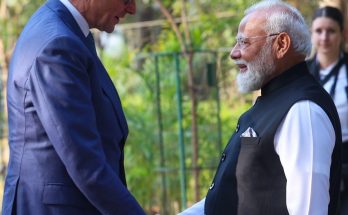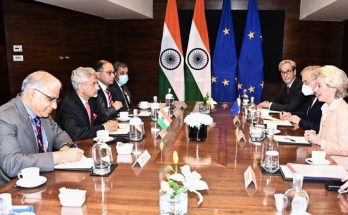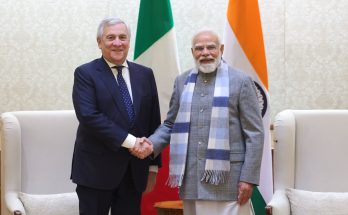
Stasis, stagnation, drifting, cooling off, losing momentum — these were some of the stock words and phrases deployed by pundits on the play of the India-US relations ahead of US Secretary of State John Kerry’s maiden visit to India. But, the picture seems to be much brighter now, with a string of high-profile visits and meetings planned in the months ahead, leading to Prime Minister Manmohan Singh’s visit to the US, likely September-October.
While analyses continue to proliferate, Lalit Mansingh, India’s former foreign secretary, offers a unique perspective on the evolving India-US relations and its future direction. Mansingh played a pivotal role as India’s ambassador to Washington (2001-2002) in spurring the transformation of the once-troubled India-US ties and has since been a robust backer of stronger and multi-layered relations between the world’s most powerful and most populous democracies.
In this interview with Manish Chand, Editor-in-Chief, India Writes (www.indiawrites.org), Mansingh shares his assessment of the key outcomes of the fourth round of India-US strategic dialogue that was held in New Delhi June 24. The dialogue, Mansingh stresses, helped clear a lot of misunderstandings and has added a fresh spark to what President Obama has called “one of the defining partnerships of the 21st century.”
(Excerpts from the interview)
Q) How do you rate the success and outcomes of the fourth round of India-US strategic dialogue?
A) The strategic dialogue is an important and crucial part of the multi-layered structure of the India-US engagement process. It was useful for the foreign ministers of the two countries to meet face-to-face and develop a personal rapport. John Kerry’s visit was specially significant as this was the first time he was coming to India as the US secretary of state. This visit was long overdue. Kerry, it must be remembered, carried some baggage when he came to India – as a senator, he wanted to patch up with Pakistan – he was, therefore, perceived in India as someone with sympathy for Pakistan. Besides, as a presidential candidate he did a lot of anti-India bashing on outsourcing. The IT sector in India is, therefore, slightly wary of Kerry. But as his visit to India demonstrated, Kerry has shown that as secretary of state, he can’t play favourites with India and Pakistan.
Q) So, Kerry’s image has improved in India following the visit, and some of those suspicions have been removed…
A) The visit has helped clear a lot of misunderstandings between the two sides and removed some suspicions about his positions and postures vis-à-vis India. The latest round of talks served as a clearing house for all sorts of misunderstandings. Before the visit, the feeling was that the relationship was stagnating. A lot of grievances were building up on both sides.
Now the picture is clearer. The latest round of talks has galvanised the relations. Prime Minister Manmohan Singh is expected to visit Washington later this year. And Vice-President Joe Biden’s visit to India has been announced.
Q) Secretary Kerry renewed the US’ support to India’s bid for a seat in the UN Security Council…
A) There is no doubt about the US’ commitment to the idea of India as a major regional power. And Kerry said as much when he said in his speech that India is going to be the state of the future. He also sees many complementarities between the economies of India and the US. This was clear when he described the US and India as the world’s two powerful economies and expressed optimism that the Indian economy will overtake the US economy one day.
Q) Talking of economy, there are reports of unhappiness in Washington over the pace of India’s economic reforms and a whole host of trade-related irritants that could impact the bilateral relationship. Do you think trade-related issues were sorted out in this dialogue?
A) On economic reforms and trade, there are operational issues and there are policy issues. Both sides have their grievances. India, for example, is rightfully worried about the impact of the new US immigration reforms on the IT and outsourcing industry. The US feels that India is not pursuing economic reforms at the pace it wants India to do. The US side has impressed upon India that economic reforms are imperative to get American investment and that India must take the next steps in economic reforms. The reforms make sense as there is a humongous current account deficit that is deterring foreign investment from coming to India. I believe that the Indian government’s point of view, and this was conveyed to the American side, that while it would like these reforms to go through, it does not have the numbers to push them through in the Indian parliament. I am sure the Americans appreciate these political compulsions. Democracy is something the Americans understand. But even with all these concerns, there is enough political will on both sides to scale up bilateral trade and investment. And this was what came through in the latest round of strategic dialogue.
Q) Do you think the prospects of the India-US nuclear deal have brightened after the June 24 talks?
A) Westinghouse is planning to seal an early works agreement with the Nuclear Power Corporation of India Limited (NPCIL). It’s a big step forward. We are already looking at land in Gujarat for the US nuclear facility. The early works agreement skirts the issue of liability and lays out the rules of procedure. The big movement forward is that despite liability concerns, American companies are now ready to set up shop in India as they are losing out on Indian nuclear business to competitors from Russia and France.
Author Profile
- India Writes Network (www.indiawrites.org) is an emerging think tank and a media-publishing company focused on international affairs & the India Story. Centre for Global India Insights is the research arm of India Writes Network. To subscribe to India and the World, write to editor@indiawrites.org. A venture of TGII Media Private Limited, a leading media, publishing and consultancy company, IWN has carved a niche for balanced and exhaustive reporting and analysis of international affairs. Eminent personalities, politicians, diplomats, authors, strategy gurus and news-makers have contributed to India Writes Network, as also “India and the World,” a magazine focused on global affairs.
Latest entries
 DiplomacyJanuary 5, 2026India walks diplomatic tightrope over US operation in Venezuela
DiplomacyJanuary 5, 2026India walks diplomatic tightrope over US operation in Venezuela India and the WorldNovember 26, 2025G20@20: Africa’s Moment – The Once and Future World Order
India and the WorldNovember 26, 2025G20@20: Africa’s Moment – The Once and Future World Order DiplomacyOctober 4, 2025UNGA Resolution 2758 Must Not Be Distorted, One-China Principle Brooks No Challenge
DiplomacyOctober 4, 2025UNGA Resolution 2758 Must Not Be Distorted, One-China Principle Brooks No Challenge India and the WorldJuly 26, 2025MPs, diplomats laud Operation Sindoor, call for national unity to combat Pakistan-sponsored terror
India and the WorldJuly 26, 2025MPs, diplomats laud Operation Sindoor, call for national unity to combat Pakistan-sponsored terror







